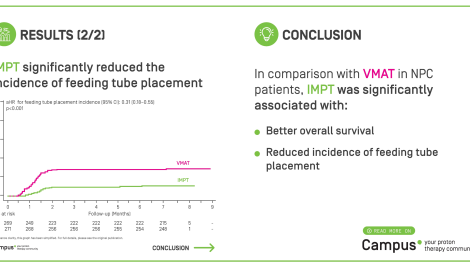Subtitle
The Potential Role of Intensity-Modulated Proton Therapy in Hepatic Carcinoma in Mitigating the Risk of Dose De-Escalation
A cohort of 30 patients was retrospectively selected as "at-risk" of dose de-escalation due to the proximity of the target volumes to dose-limiting healthy structures. IMPT plans were compared to volumetric modulated arc therapy (VMAT) RapidArc (RA) plans. The maximum dose prescription foreseen was 75 Gy in 3 fractions.
This plan comparison study found that IMPT and VMAT plans resulted in equivalent target dose for CTV and PTV, however significant improvements were observed with IMPT for all organs at risk such as the ribs, chest wall, heart, duodenum, stomach and bowel bag. Twenty patients violated one or more binding constraints with RA, while only 2 with IMPT. Some dose de-intensification would have been required to respect the constraints. IMPT might result in advantages compared to photon-based VMAT for HCC patients to be treated with ablative SBRT in mitigating the risk of dose de-escalation.


